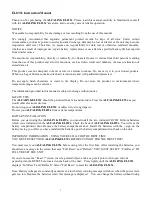
64
MIDI Parameters
Channel
Allows you to select the MIDI channel on which the E-A7 should
receive NTA messages.
Parameter
Value
Channel
Ch1–Ch16
Rx
This parameter allows you to specify whether (
“On”
) or not
(
“Off”
) the selected MIDI channel should be used to receive chord
information.
Parameter
Value
Rx
Off, On
Rx Octave
Use this parameter to transpose the notes received on the selected
MIDI channel (
“Ch”
) in steps of one octave.
Parameter
Value
Rx Octave
–4–0–4
Rx Global Limit Low/High
These parameters allow you to set the note range to be received.
If not all note messages of the selected MIDI channel should be
received by the NTA
“part,”
set the range to the desired values.
Parameter
Value
Rx Global Limit
Low
C- –G9
Rx Global Limit
High
C- –G9
NOTE
The
“Limit Low”
value cannot be higher than the
“Limit High”
value (and vice versa).
Parameters
The following parameters are located on the display page that
can be selected using
[MENU]
0
“MIDI”
0
“Edit System”
0
“Parameters ”
This page contains several parameters that are not related to one
another (the other MIDI pages always concentrate on one aspect).
Part Switch
This parameter allows you to specify whether or not a muted part
should go on sending MIDI messages:
Parameter
Value
Part Switch
Internal, Int+MIDI
Internal:
A muted part can no longer be played via the E-A7’s
keyboard or Arranger/song player but continues to send MIDI
messages. Selecting
“Internal”
and muting a part thus has the same
effect as selecting
“Local Off”
Int+MIDI:
A muted part can no longer be played via the E-A7’s
keyboard or Arranger/song player and no longer sends MIDI
messages.
Tx Velocity
Your E-A7 is equipped with a velocity-sensitive keyboard and a tone
generator capable of responding to velocity messages. Use this
parameter to switch the transmission (TX) of velocity messages on
or off.
If you don’t select
“On,”
specify which velocity value to use instead of
the continuous flux. The value you set will be used for all notes sent
to MIDI OUT/USB COMPUTER.
Parameter
Value
Tx Velocity
On, 1–127
Tx SysEx
Use this parameter to specify whether (
“On”
) or not (
“Off”
) the E-A7
should send SysEx messages.
Such messages are not standardized, so that each manufacturer can
use them ad lib for temporary (or permanent) changes to the way a
part behaves.
Effects parameters, for instance, can only be changed via SysEx
messages.
Such messages may slow down playback on external MIDI
instruments or yield no effect at all, which is why you have the option
to switch off their transmission in the first place.
Parameter
Value
Tx Sysex
Off, On
Tx Data Change
This parameter allows you to specify how the original program
changes of the songs you play back are transmitted via MIDI. The E-A7
may change sound addresses (usually CC00 and CC32 values) so as to
play back all songs with the best possible quality.
If you switch this parameter on, such real-time transformations
are also transmitted via MIDI. If you switch this parameter off, the
original sound addresses are transmitted to the receiving device.
(But the E-A7’s tone generator continues to
“enhance”
the songs you
play back.)
Parameter
Value
Tx Data Chg
Off, On
Octave Tx
The
“Octave Tx”
parameter can be set to Absolute or Relative. You
may have noticed that if you assign a bass sound to the UP1 or UP2
part in SPLIT mode, the notes are transposed to allow you to play
meaningful bass lines using the UP1/2 part.
“Relative”
means that
this internal (and automatic) transposition is translated into MIDI
note numbers.
In
“Absolute”
mode, however, the MIDI note numbers sent to other
instruments will be the ones of the keys you actually press.
Parameter
Value
Octave Tx
Relative, Absolute
Rx Velocity
Your E-A7 is equipped with a velocity-sensitive keyboard and a
tone generator capable of responding to velocity messages. This
parameter allows you to switch the reception (RX) of velocity
messages on or off. If you don’t need
“On,”
specify which velocity
value to use instead of the continuous flux. This value will be used for
all notes received via MIDI.
Parameter
Value
Rx Velocity
On, 1–127







































